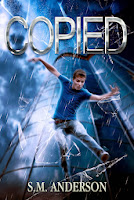I am pleased to welcome sci-fi/fantasy author, Terry W. Ervin II back to the writing chair to talk to us about the importance of research. (You can read
Terry's One Word Interview here.) His latest novel, Relic Tech, is an action-packed sci-fi adventure I highly recommend. Take it away, Terry!
 Research: Even the Little Things Add Up
Research: Even the Little Things Add UpWhen readers decide to pick up one of my novels, they’re committing both time and money—valuable commodities that they could easily spend elsewhere. Because of that fact, I strive to tell the best story I can, which includes doing the necessary research. To me necessary means not only the getting the big things right, but the small, peripheral ones as well.
For example, in my debut novel, Flank Hawk, one of the factors that led to the post-apocalyptic setting was handful of nuclear warheads penetrating the U.S. ballistic missile defense systems and detonating. Pulled from two chapter starts:
Nestled in Cheyenne Mountain, NORAD had been on full alert. Coordinated satellites viewing the earth in the infrared part of the spectrum recorded the demise of one ballistic missile while radars, including the Cobra Dane early-warning on in the Aleutian chain and the X-band floating on a nearby platform, tracked the two surviving sub launched missiles as they climbed…
…A battery of six interceptor rockets from silos at Fort Greely in Alaska and four more from California’s Vandenberg Air Force Base raced skyward. An experimental tracking and intercept aircraft from the Vandenberg base was already aloft. While it strained for altitude, airmen activated its advanced tracking and targeting systems, and prepared its powerful laser should any warheads survive the kill vehicles housed in the interceptor rockets.
To get it right required hours of research, learning the basics of the USA’s missile defense systems and equipment, capabilities, and locations along the West Coast. Only a fraction of what I dug up and organized actually made it to the pages of the novel, and only to a few paragraphs on a few pages, but the point of research isn’t to show off all the work an author did. It’s to incorporate only the necessary details to enhance the story.
As an author, I want to get it right for the reader, not only for the story, but because the readers out there have varied knowledge and experience. I’d be embarrassed to receive an email from a disappointed reader, telling me I’d gotten it wrong—especially something that I could’ve gotten right.
Another example comes from my most recent release, Relic Tech. It’s a science fiction novel that involves some interstellar space travel. One of the things I incorporated was time dilation, which is a phenomenon that occurs as a ship travels through space. The closer a ship comes to approaching the speed of light, the greater the time variation there is between those aboard the traveling ship as compared planet side individuals.

In Relic Tech, the time dilation was along the lines of minutes and hours, rather than months and years. Still, Security Specialist Keesay (the main character) uses a 20th century watch not controlled by the ship’s chronometer to track the phenomenon. It’s only a minor point in the plot, as Specialist Keesay attempts to predict when the civil transport Kalavar will actually emerge at its destination, as opposed to what’s been told to the crew.
Not only did it take considerable time and effort to research and calculate the time dilation based on the Kalavar’s rate of travel, but it was also important to remain consistent with the distances between the star systems and exoplanets, (only a few fictional) incorporated into the storyline, and how long the actual travel between them would take based on a ship’s or message rocket’s speed.
All of this took time, a lot of time—time that some might argue wasn’t really necessary. Nevertheless I did it, all the charts, figures and calculations, and had it double-checked by my former college roommate, who majored in physics and minored in astronomy, and then went on to earn a Master’s degree in mathematics. You might guess, in addition to internet research, I’m a firm believer in consulting experts in fields where my knowledge isn’t adequate.
Would the a reader know if I made it all up…remained orderly and consistent, but sort of played a little fast and loose with the rate of travel and distances, and ignored the relatively minor time dilation? Probably not. Would they have cared? Maybe not. But I owe it to the reader, to get as much right as I reasonably can. Even the little things, because I believe they add up, giving my novels, such as Relic Tech, depth, authenticity, and consistency.

Terry W. Ervin II is an English teacher who enjoys writing fantasy and science fiction. His First Civilization’s Legacy Series includes FLANK HAWK and BLOOD SWORD. He is focused on completing SOUL FORGE, the third novel in the fantasy series.

His newest release through Gryphonwood Press is RELIC TECH, a science fiction novel packed with action, adventure, aliens and even a bit of a mystery.
In addition to writing novels, Terry’s short stories have appeared in over a dozen anthologies, magazines and ezines. The genres range from science fiction and mystery to horror and inspirational. GENRE SHOTGUN is a collection containing all of his previously published short stories.
To contact Terry or learn more about his writing endeavors, visit his website at
www.ervin-author.com and his blog, Up Around the Corner, at
uparoundthecorner.blogspot.com (with information on where his newest release is currently available)
































.jpg)




